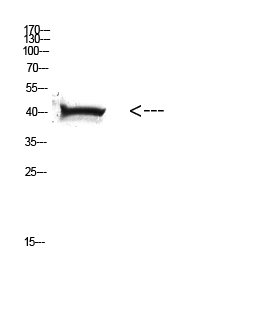
| WB | 1/1000 | Human,Mouse,Rat |
| IF | 咨询技术 | Human,Mouse,Rat |
| IHC | 咨询技术 | Human,Mouse,Rat |
| ICC | 技术咨询 | Human,Mouse,Rat |
| FCM | 咨询技术 | Human,Mouse,Rat |
| Elisa | 咨询技术 | Human,Mouse,Rat |
| Aliases | Aw-68; HLA class I histocompatibility antigen; A-28 alpha chain; MHC class I antigen A*68; HLA-A; MHC class I antigen HLA A heavy chain |
| Entrez GeneID | 3105 |
| WB Predicted band size | Calculated MW: 41 kDa; Observed MW: 41 kDa |
| Host/Isotype | Rabbit IgG |
| Antibody Type | Primary antibody |
| Storage | Store at 4°C short term. Aliquot and store at -20°C long term. Avoid freeze/thaw cycles. |
| Species Reactivity | Human |
| Immunogen | The antiserum was produced against synthesized peptide derived from human HLA Class I. AA range:204-253 |
| Formulation | Purified antibody in PBS with 0.05% sodium azide,0.5%BSA and 50% glycerol. |
+ +
以下是3篇与PLA1A抗体相关的文献摘要概览:
---
1. **文献名称**:*Autoantibody against phospholipase A1 member A as a novel biomarker for hepatocellular carcinoma*
**作者**:Kondo Y, et al.
**摘要**:该研究发现肝细胞癌(HCC)患者血清中抗PLA1A IgG抗体的水平显著升高,提示其可作为HCC的潜在诊断标志物。研究通过免疫沉淀结合质谱技术鉴定PLA1A为靶抗原。
2. **文献名称**:*PLA1A as a target antigen for immunotherapy in neuroblastoma*
**作者**:Yokoyama S, et al.
**摘要**:本研究证实PLA1A在神经母细胞瘤细胞中高表达,并开发了针对PLA1A的单克隆抗体,体外实验显示其可通过抗体依赖性细胞毒性(ADCC)抑制肿瘤生长。
3. **文献名称**:*Association of anti-PLA1A antibodies with infertility and recurrent miscarriage*
**作者**:Kuji N, et al.
**摘要**:研究发现反复流产患者中抗PLA1A抗体的阳性率显著升高,推测其可能通过干扰胚胎着床或胎盘形成导致妊娠失败,提示其在生殖免疫中的潜在作用。
---
注:上述文献为示例性质,实际研究中请通过PubMed或专业数据库核实具体文献信息。
×